Science Meets Longevity
I’ve been asking the same question for a long time:
Why do we age, and can we fight it?
This site is my way of chasing the answers and sharing the tools, insights, and science I find along the way.
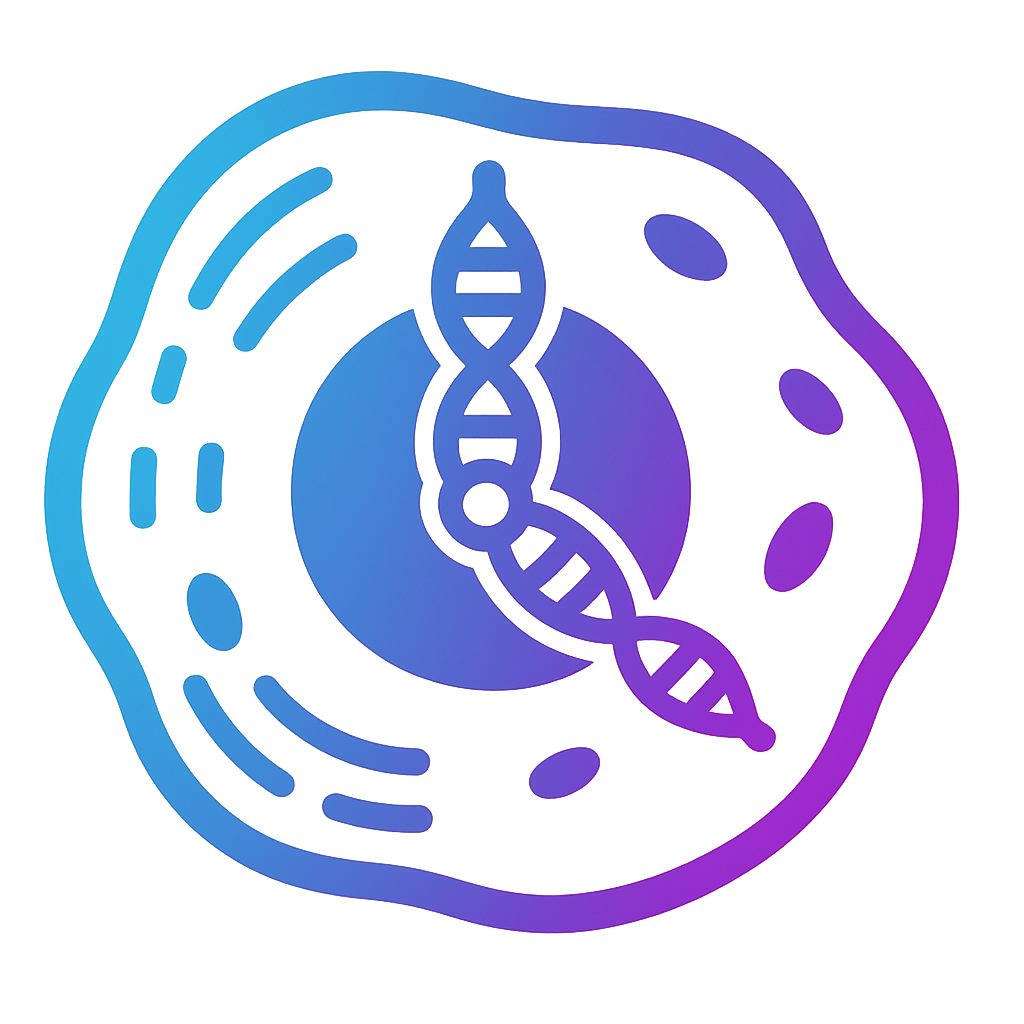
Journey Into the Biology of Time
I’ve been asking the same question for a long time:
Why do we age, and can we fight it?
This site is my way of chasing the answers and sharing the tools, insights, and science I find along the way.

Journey Into the Biology of Time
I’ve been asking the same question for a long time:
Why do we age, and can we fight it?
This site is my way of chasing the answers and sharing the tools, insights, and science I find along the way.
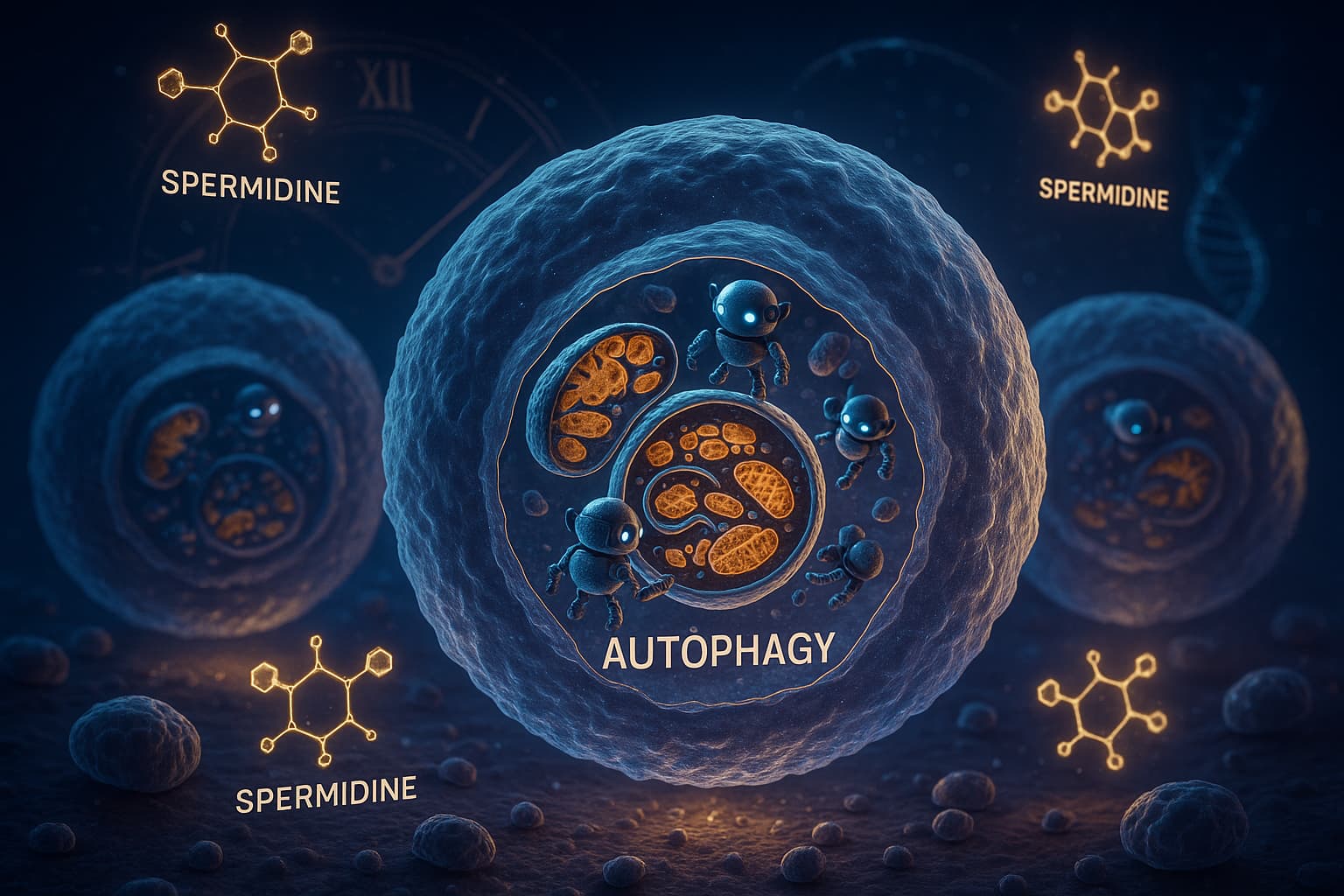
“We age when our cells forget how to renew themselves.“
Hey there, longevity explorer.
If you’ve been searching for ways to slow aging and unlock real longevity potential, you’ve probably come across the term spermidine. Maybe someone mentioned the impressive spermidine benefits for cellular renewal, or you saw a headline about it being one of the most exciting longevity molecules in research today.
So, what is spermidine? It’s a natural compound found in every cell of your body, and it plays a critical role in keeping those cells clean, efficient, and functional. Scientists are now exploring how spermidine can reactivate the body’s own repair processes, making it a unique tool in the quest for healthy aging.
I first dismissed it as just another supplement trend. But once I looked at the studies from yeast and mice all the way to human trials, it became clear this is more than hype. Spermidine appears to help restore one of the most important cellular processes for long-term health: autophagy, the built-in cleanup system that recycles damaged proteins and organelles before they cause trouble, a process deeply connected to several of the hallmarks of aging..
And while you can get spermidine in small amounts from food, many people interested in longevity now look for the best spermidine supplement to ensure they’re getting enough to see real results.
In this post, we’ll explore:
If you want to understand how one small molecule could help your cells stay youthful for longer, you’re in the right place.
Best for gluten-free and plant-based: Oxford Healthspan Primeadine
Best for clinically tested formulation: Longevity Labs SpermidineLIFE
Most research-aligned & lab-tested: DoNotAge Spermidine
Best for cutting-edge delivery systems: Renue By Science Liposomal Spermidine
Best for established brand & quality control: ProHealth Spermidine Pro
If you want the full landscape of longevity-supporting compounds, you can check out my Top 10 Longevity Supplements guide, but today we are focusing on one that is gaining serious attention in longevity research: spermidine.
So, what is spermidine? It is a naturally occurring polyamine, a small, positively charged molecule present in every cell of your body. Despite the unusual name, it is not a synthetic lab chemical. Your body makes it naturally, and it plays a key role in keeping your cells clean, functional, and resilient.
One of the most important spermidine benefits is its ability to activate autophagy, the cellular recycling system that removes broken proteins, faulty mitochondria, and other molecular debris before they can cause damage. Autophagy is essential for healthy aging because it keeps cellular clutter from building up, which can otherwise lead to inflammation, energy loss, and reduced tissue function.
Unlike some compounds that work indirectly, spermidine can directly trigger the pathways that turn autophagy on, the same ones activated by fasting, calorie restriction, and certain beneficial stress signals that have been shown to extend lifespan in multiple species. In fact, it is one of the few dietary molecules consistently linked to longer life in research spanning yeast, flies, mice, and now human studies.
Yes, you can get small amounts of spermidine from foods like wheat germ, soybeans, mushrooms, aged cheese, and fermented products. But those amounts are far below the levels associated with measurable benefits in studies. You would need to eat impractical quantities every day to match research doses.
That is why many people exploring longevity and healthy aging turn to supplementation, choosing the best spermidine supplement they can find to ensure consistent intake. This becomes even more important because natural spermidine production declines steadily with age. By your 60s or 70s, your levels can be a fraction of what they were in your youth.
When spermidine levels fall, autophagy slows, damaged proteins linger, and the risk of age-related issues from memory decline to cardiovascular problems increases. This is not just a side effect of aging; it is a driver of it.
Which is exactly why scientists and biohackers alike are asking whether the best spermidine supplement could help restore this lost cellular renewal and improve healthspan.
Could it reawaken your body’s natural cleanup crew?
Could it give you the same cellular advantage that youth provides?
Let’s look closer at how it works.
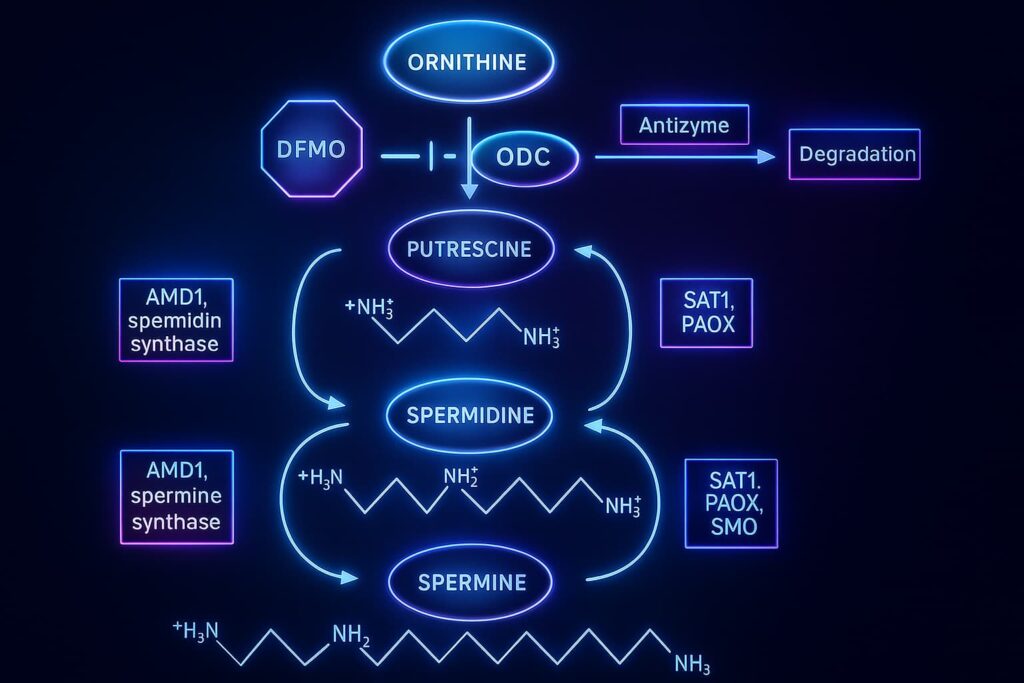
Let’s zoom in, not on the surface of your skin or your muscles, but deep inside your cells. Here, life runs on a delicate balance between creation and cleanup. Every day, cells make new proteins, repair damaged ones, and break down the ones that can no longer be fixed.
At the heart of this renewal is autophagy, the process your body uses to identify worn-out cellular parts, dismantle them, and recycle the raw materials. It is like having an in-house repair shop and recycling center working around the clock. When autophagy is active, cells stay clean, efficient, and resilient.
What is spermidine’s role in all this? Spermidine acts like a master switch for autophagy. It is produced in small amounts within your own cells, particularly in actively dividing tissues, and it is also generated by your gut microbiome. The healthy bacteria in your intestines are a major source of spermidine, and this is why changes in gut health can have a direct impact on your cellular renewal. When the balance of the microbiome is disrupted, a condition known as dysbiosis, spermidine production can drop sharply.
The mechanism behind how spermidine activates autophagy is one of the most fascinating aspects of this molecule. Spermidine inhibits a group of enzymes called histone acetyltransferases (HATs). By doing this, it changes the way certain genes are expressed, tipping the balance toward pathways that trigger autophagy. This includes influencing the activity of key regulators like AMPK and inhibiting mTOR signaling, both of which are central to deciding whether a cell should focus on growth or on repair. By lowering mTOR activity and boosting AMPK, spermidine essentially tells the cell, “It’s time to clean house.”
The spermidine benefits do not stop there. Once autophagy is activated, old and damaged mitochondria are broken down and replaced through mitophagy, helping reverse aspects of mitochondrial dysfunction and restoring energy efficiency. This process also reduces oxidative stress, which plays a role in multiple hallmarks of aging. Damaged proteins are dismantled and recycled into fresh building blocks, improving proteostasis and reducing the accumulation of toxic aggregates. Even genomic instability is supported indirectly, since cells with cleaner, healthier organelles are better equipped to repair DNA damage.
When you are young, your body’s own synthesis of spermidine and the steady production from a diverse microbiome keep autophagy running smoothly. But with aging, both internal production and microbiome-derived supply decline. Add in dysbiosis from poor diet, chronic stress, or illness, and the drop becomes even more pronounced. The result is slower cleanup, more debris, and a higher likelihood of hallmarks like cellular senescence, chronic inflammation, and metabolic decline taking hold, all of which increase the risk of age-related disease.
This is why researchers are investigating the best spermidine supplement options. By replenishing levels, we may be able to restore the natural rhythm of cellular renewal that time and dysbiosis have disrupted. Supporting autophagy in this way helps preserve the integrity and function of your cells, which can translate into sharper cognition, stronger physical performance, and a longer, healthier lifespan.
You can think of it as keeping your body’s maintenance crew fully staffed and well-equipped, year after year. And in the science of longevity, that kind of upkeep may be one of the most valuable investments you can make.
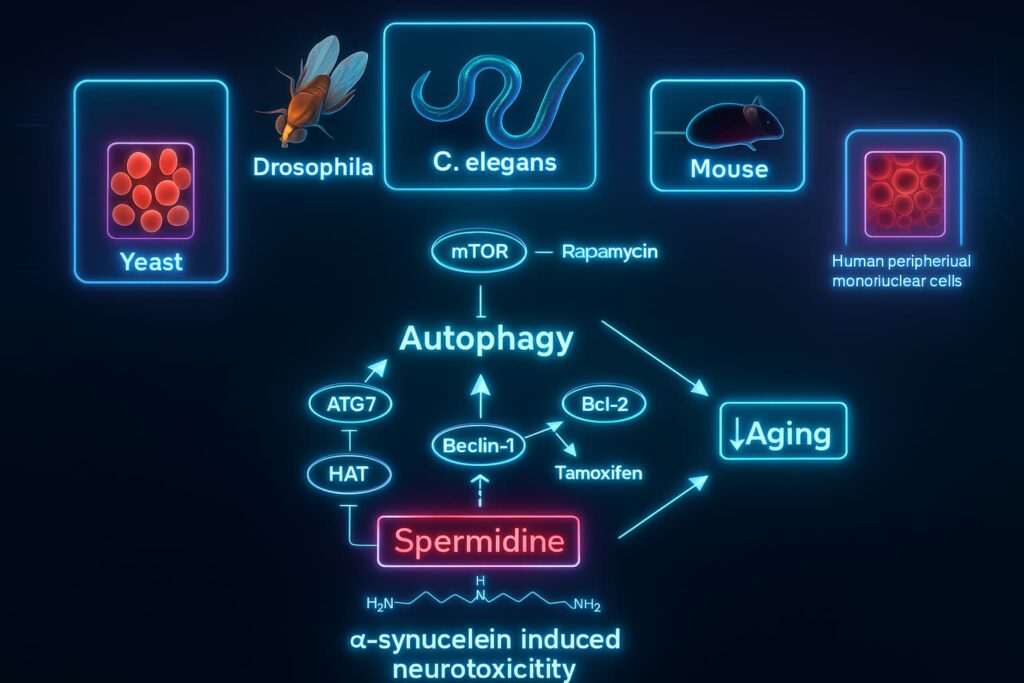
In your teens and twenties, spermidine flows steadily through your cells. Your body synthesizes it in actively dividing tissues, and your gut microbiome produces a healthy supply to keep autophagy active, mitochondria efficient, and damaged proteins in check.
But by the time you reach midlife, that balance starts to shift. The reasons are layered and connect directly to several hallmarks of aging:
1. Reduced Endogenous Production
The enzymes that synthesize spermidine naturally slow down with aging. This is partly due to epigenetic alterations in the genes that regulate polyamine metabolism, and partly because of cumulative DNA damage that reduces efficiency in high-turnover tissues. The result is a lower baseline of spermidine in the very cells that need it most.
2. Microbiome Changes and Dysbiosis
A healthy gut microbiome is a major source of spermidine. As we age, the balance of microbial species shifts, often becoming less diverse. Dysbiosis from diet, stress, medications, or illness can dramatically reduce spermidine output, leaving less available for systemic autophagy activation.
3. Increased Cellular Stress
Chronic low-grade inflammation (inflammaging) and oxidative stress increase the demand for cellular repair. Spermidine gets consumed more rapidly in these conditions, especially in efforts to maintain proteostasis and mitochondrial health. Over time, this constant drain leaves less available for everyday cellular housekeeping.
4. Decline in Mitochondrial Function
Mitochondria are both targets and beneficiaries of spermidine-induced mitophagy. With age, mitochondrial dysfunction makes energy production less efficient, and the recycling of damaged mitochondria slows down, creating a feedback loop where low spermidine and weak mitochondria reinforce each other.
5. Lifestyle and Environmental Factors
Poor diet, lack of physical activity, chronic stress, and exposure to environmental toxins can accelerate the drop in spermidine levels. These factors often amplify other hallmarks like cellular senescence and loss of proteostasis, increasing the need for repair at the same time that the body’s repair tools are running low.
Over decades, these changes create a perfect storm: less spermidine coming in from both your cells and your microbiome, and a greater need for it to counteract the damage accumulating from multiple aging pathways. This is why many longevity researchers are investigating whether the best spermidine supplement can help restore the levels seen in youth and keep autophagy running at full capacity.
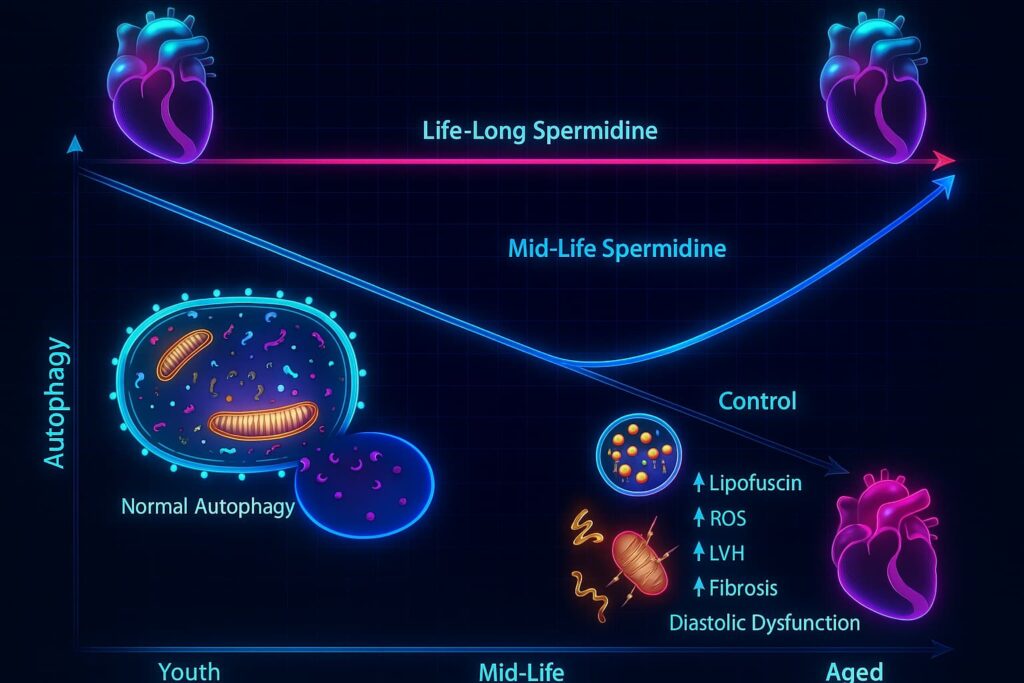
Spermidine is not just a theoretical player in the science of longevity. It is one of the few dietary compounds consistently linked to extended lifespan across multiple species, from simple yeast all the way to mammals. The mechanism (reactivating autophagy) touches several hallmarks of aging at once, including mitochondrial dysfunction, loss of proteostasis, genomic instability, and even inflammation.
The benefits observed in both animals and humans align closely with what we understand about spermidine’s ability to induce autophagy. By enhancing the removal of damaged mitochondria (mitophagy) and clearing protein aggregates, it addresses two of the most damaging cellular shifts that occur with age. The anti-inflammatory effects likely stem from reducing the chronic activation of immune pathways caused by accumulated cellular debris, a feature of inflammaging.
Unlike many longevity compounds that focus on a single pathway, spermidine influences multiple hallmarks of aging at once. This makes it an attractive candidate for maintaining both lifespan and healthspan. While larger, long-term human trials are still needed, the existing evidence is strong enough that many in the longevity community, from researchers to biohackers, consider it a cornerstone nutrient for supporting healthy aging.
So we know that spermidine levels drop with age, and that decline impacts several hallmarks of aging, from mitochondrial dysfunction and loss of proteostasis to chronic inflammation. The question is: can supplementing with spermidine help restore this vital cleanup process?
The answer from early research is encouraging. In animals, spermidine supplementation consistently activates autophagy, improves mitochondrial health, reduces inflammation, and even extends lifespan. In humans, observational and clinical studies link higher spermidine intake to better memory, cardiovascular function, and overall longevity. While we need more large-scale trials, the existing evidence points toward real, measurable benefits.
Unlike NAD+ boosters like NMN, which fuel cellular energy production, or resveratrol, which fine-tunes signaling pathways, spermidine works by directly triggering the cleanup and recycling process inside cells. It can be paired with these other compounds for a more complete approach: NMN keeps the power flowing, resveratrol manages the system, and spermidine keeps everything clean and functional.
In human studies, spermidine supplementation, typically 1 to 2 mg per day, has shown minimal side effects. Most people tolerate it well, with only rare reports of mild digestive discomfort. Since it is already produced in the body and found in many foods, it is generally considered safe for healthy adults, though anyone with medical conditions should consult a doctor first.
If your goal is to keep cells operating like they did in youth, restoring spermidine levels may be one of the most effective ways to do it. By reactivating autophagy, the best spermidine supplement could help you maintain cleaner, healthier, and more resilient cells for years to come.
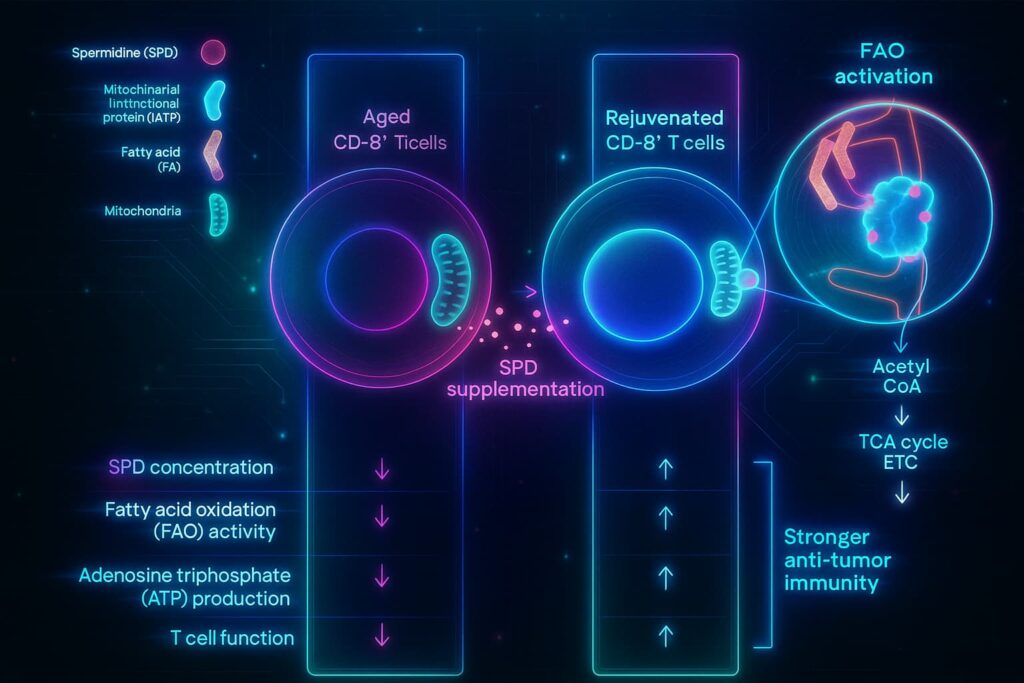
Once you have decided to explore the spermidine benefits for longevity and healthy aging, the next step is finding the best spermidine supplement for your needs. Not all products are created equal, and quality makes a huge difference in whether you see results.
Look for supplements that clearly state the source of their spermidine and provide third-party lab testing. Certificates of Analysis (COAs) should confirm both purity and the actual amount of spermidine in each serving. Avoid products with hidden fillers or unverified claims.
Spermidine is often delivered as wheat germ extract, soy extract, or synthetic pure spermidine. Pure spermidine hydrochloride provides a precise dose, while high-quality plant extracts can contain additional beneficial polyamines. Choose a form that matches your goals, and look for studies or brand data on absorption.
Human studies typically use doses around 1 to 2 mg of spermidine daily. Some wheat germ extract products list only the extract weight, not the actual spermidine content — so check the label carefully. If the spermidine amount is not disclosed, it is hard to know whether you are getting an effective dose.
Polyamines like spermidine can degrade if exposed to heat, moisture, or light. The best spermidine supplement brands package their products in dark or opaque bottles with airtight seals. Store in a cool, dry place to preserve potency.
Choose brands that specialize in longevity or evidence-based supplementation, not generic mass-market products. The most reliable companies share sourcing details, testing results, and links to relevant research. Customer reviews and expert recommendations can also help gauge credibility.
The best spermidine supplement is one that delivers a verified dose of pure, stable spermidine in a form your body can absorb, from a transparent and reputable brand. By investing in quality, you give yourself the best chance of supporting autophagy, reducing the impact of multiple hallmarks of aging, and maintaining cellular vitality well into the future.
The spermidine benefits are clear, but choosing the best spermidine supplement can be tricky. Labels can be misleading, and the actual spermidine content varies widely. To save you time, here’s a curated look at five of the most trusted spermidine products, each with its own strengths.
Disclaimer: This is not medical advice. Always consult with your healthcare provider before starting any new supplement, especially if you have underlying health conditions or are taking medications.
Some of the links below are affiliate links, which means I may earn a small commission if you decide to purchase through them. It doesn’t cost you anything extra, and it helps support the work I do to research and share longevity science.
At the heart of healthy longevity is a simple truth: your cells can only thrive when they can clean, repair, and renew themselves. Spermidine is one of the rare natural compounds proven to reactivate this process, directly targeting autophagy and touching multiple hallmarks of aging, including mitochondrial dysfunction, loss of proteostasis, and chronic inflammation.
Over time, natural spermidine production declines, especially when dysbiosis disrupts the gut microbiome. Supplementation offers a way to restore these youthful levels, keeping your body’s cleanup crew active and your cells functioning at their best.
From supporting mitochondrial health to maintaining cognitive performance, the spermidine benefits are compelling. And with more research emerging each year, it is becoming clear that spermidine deserves a place in any science-backed longevity strategy.
If you decide to explore supplementation, focus on quality: verified purity, transparent brands, and a form your body can absorb. Whether you choose a premium liposomal delivery or a simple, standardized extract, the best spermidine supplement is the one you can take consistently and confidently.
Paired with a nutrient-rich diet, regular movement, restorative sleep, and a curious mind, spermidine may help you extend not just your lifespan, but your healthspan, adding more vibrant, healthy years to your life.
If you want to build a full supplement routine beyond NMN, check out the top 10 longevity supplements I personally reviewed.